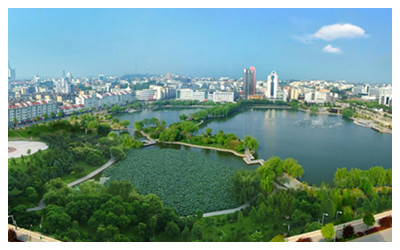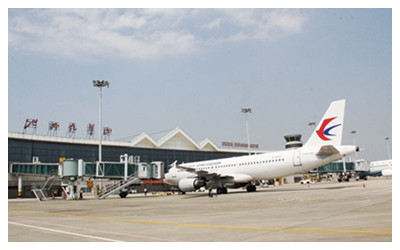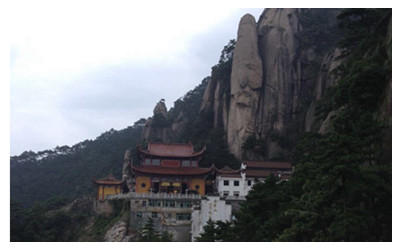Skype: neodalle-travel
Tel: +86 135 7447 2266
E-mail: sales@visitaroundchina.com


Chizhou is a city with rich history and profound cultural deposits. Chizhou has enjoyed the fame of “home of poets for a millennium” and is listed among Anhui Provincial Historic and Cultural Famous Cities. Chizhou has a history of nearly 1,400 years, dating back to 621 when the city was first established in the fourth year of Wude (a reign title) in the Tang Dynasty (i.e. AD 621). Throughout history, praises were heaped on Chizhou by poets and refined scholars. Xiao Tong, the crown prince of the Liang Dynasty, compiled the Zhao Ming Anthology of Literature in Chizhou City, which is the earliest poetry selection ever existed in the history of Chinese literature. Li Bai, the most accomplished poet of the Tang Dynasty, has paid 9 visits to Mt. Jiuhua and 5 trips to Qiupu River, wrote the famous poem Qiupu Song and other 16 poems to describe the splendid landscape of Chizhou City. The great poet Du Mu of the late Tang Dynasty, who was the chief director of Chizhou City at that time, wrote the famous poem Ching Ming, describing the scene of traditional Chinese Qingming Festival (also called Ching Ming) in Xinghua Village of Chizhou City. The local scholar Lang Sui of the Qing Dynasty compiled the Historical Record of Xinghua Village which was the only village chronicle collected by the Imperial Collection of Four. Thanks to those literary works, Xinghua Village in Chizhou City enjoys an immortal and world-wide fame. Through years, literary figures such as Tao Yuanming(the greatest poet during the centuries between the Han and Tang dynasties and the foremost of the "recluse" poets), Du Mu (a leading Chinese poet of the late Tang Dynasty and regarded as a major poet during a golden age of Chinese poetry), Bao Zheng (a government officer during the reign of Emperor Renzong in ancient China's Song Dynasty and nicknamed "Clear Sky Bao" who today is respected as the cultural symbol of justice in Greater China) and Yue Fei (a military general during the era of the Southern Song Dynasty and widely seen as a patriot and national hero in China) , had all travelled or lived here and they had written more than one thousand immortal well-known poems concerning Chizhou. In addition, Chizhou Nuo Opera, known as the “living fossil” of Chinese Drama, Qingyang Opera, regarded as the origination of Beijing Opera, and the Festival Lantern Show of Dongzhi are listed as National Intangible Cultural Heritages. Furthermore, the local culture of Buddhism, poem, drama and tea is of long standing and enjoy great fame in the world.
Chizhou is a city with great ecology and beautiful environment. The city acquired the fame of “a huge natural oxygen bar”for its superior ecology and oxygen-rich air. The city’s air quality is constantly ranked as a top city in Anhui Province. The city’s fresh air contains 35 times as many negative oxygen ions as the national standard. The water quality of all the main rivers in Chizhou City is above excellent. The forest coverage ratio of Chizhou is nearly 60%. In its built-up urban area, 43.4% of the ground surface is covered by vegetation, the green coverage rate reaches 38.4% and the per capita public green area amounts to 13.1 square meters. Hence, Chizhou City has won honors such as National Garden City,National Demonstration City of Urban Ecology, National Forest City, and China Habitat Environment Award 2013. With the fantastic and top-quality environment in middle-eastern China, Chizhou City is reputed as one of best place to live in China.
 Chizhou is a city of advantageous location and convenient traffic. Chizhou is one of the core areas of the International Cultural & Tourism Demonstration Zone in South Anhui and is a key member city of the Industrial Transfer Demonstration Zone in the Anhui Yangtze River City Belt as well. With a 163 km-long section of the Yangtze River flowing across the city, Chizhou Harbor is a national first-rank open port, one of the key ports on the main line of the Yangtze River, capable of berthing 5000-ton ships throughout the year. It is also an assigned dock for both foreign and domestic cruises along Yangtze River within Anhui Province to enter the International Cultural & Tourism Demonstration Zone in the South Anhui. Besides, the city is accessible by the Shanghai–Chongqing Expressway, Jinan-Guangzhou Expressway, Beijing–Taipei Expressway, Tongling-Jiujiang Railway, No. 206 national highway,and No. 318 national highway. Chizhou Jiuhuashan Airport was put into operation and opened flights to big cities such as Beijing, Shanghai, Chengdu and Guangzhou. The Nanjing-Anqing intercity railway and Wangjiang-Dongzhi Yangtze River Highway Bridge were also put into operation too. Furthermore, Chizhou Yangtze River Highway Bridge, the expressway linking Dongzhi County of Chizhou City and Jiujiang City of Jiangsu Province are under rapid construction. The waterway, expressways, highways, railways and airport etc. allow Chizhou City easily accessible.
Chizhou is a city of advantageous location and convenient traffic. Chizhou is one of the core areas of the International Cultural & Tourism Demonstration Zone in South Anhui and is a key member city of the Industrial Transfer Demonstration Zone in the Anhui Yangtze River City Belt as well. With a 163 km-long section of the Yangtze River flowing across the city, Chizhou Harbor is a national first-rank open port, one of the key ports on the main line of the Yangtze River, capable of berthing 5000-ton ships throughout the year. It is also an assigned dock for both foreign and domestic cruises along Yangtze River within Anhui Province to enter the International Cultural & Tourism Demonstration Zone in the South Anhui. Besides, the city is accessible by the Shanghai–Chongqing Expressway, Jinan-Guangzhou Expressway, Beijing–Taipei Expressway, Tongling-Jiujiang Railway, No. 206 national highway,and No. 318 national highway. Chizhou Jiuhuashan Airport was put into operation and opened flights to big cities such as Beijing, Shanghai, Chengdu and Guangzhou. The Nanjing-Anqing intercity railway and Wangjiang-Dongzhi Yangtze River Highway Bridge were also put into operation too. Furthermore, Chizhou Yangtze River Highway Bridge, the expressway linking Dongzhi County of Chizhou City and Jiujiang City of Jiangsu Province are under rapid construction. The waterway, expressways, highways, railways and airport etc. allow Chizhou City easily accessible.
 Chizhou is a city of abundant material and rich natural resources. Chizhou is regarded as “A Land of Milk and Honey” in areas south of the Yangtze River since ancient times. It’s an important base for commodity grain, high-quality cotton, export-oriented black tea, cocoon-made silk and fast-growing plantations. Chizhou City is awarded as one of China Excellent Tourism Cities since the city owns more than 300 tourist spots. The national forest park, Jiuhua Mountain, known as one of China’s Four Great Buddhist Mountains, is located in Chizhou and it is also one of the National Key Scenic Spots, ranked as a 5A National Tourism Area. Other famous scenic spots include Guniujiang, a national natural reserve for wildlife and famed as “a gene bank of flora and fauna in East China” and Shengjin Lake, a natural reserve for important wetlands in Asia and famed as “The lake of crane in China”. With a great variety of minerals and large reserves, Chizhou has discovered more than 40 minerals with proven reserves. Its mineral reserves of non-ferrous metals like lead, zinc, antimony and manganese are top among 16 cities in Anhui Province. Especially its non-metallic mineral reserves such as limestone calcite, dolomite, and quartz sand, etc. are of high quality, large reserves and with great potential to be exploited & processed which are regarded as the top one in the eastern China. Currently, the industries of non-metal new material, non-ferrous new material, chemistry, mechanical equipments and electronic information have been formed primarily in Chizhou City.
Chizhou is a city of abundant material and rich natural resources. Chizhou is regarded as “A Land of Milk and Honey” in areas south of the Yangtze River since ancient times. It’s an important base for commodity grain, high-quality cotton, export-oriented black tea, cocoon-made silk and fast-growing plantations. Chizhou City is awarded as one of China Excellent Tourism Cities since the city owns more than 300 tourist spots. The national forest park, Jiuhua Mountain, known as one of China’s Four Great Buddhist Mountains, is located in Chizhou and it is also one of the National Key Scenic Spots, ranked as a 5A National Tourism Area. Other famous scenic spots include Guniujiang, a national natural reserve for wildlife and famed as “a gene bank of flora and fauna in East China” and Shengjin Lake, a natural reserve for important wetlands in Asia and famed as “The lake of crane in China”. With a great variety of minerals and large reserves, Chizhou has discovered more than 40 minerals with proven reserves. Its mineral reserves of non-ferrous metals like lead, zinc, antimony and manganese are top among 16 cities in Anhui Province. Especially its non-metallic mineral reserves such as limestone calcite, dolomite, and quartz sand, etc. are of high quality, large reserves and with great potential to be exploited & processed which are regarded as the top one in the eastern China. Currently, the industries of non-metal new material, non-ferrous new material, chemistry, mechanical equipments and electronic information have been formed primarily in Chizhou City.
Chizhou is a city of impressive achievements and with great potential. In recent years, Chizhou city is making great efforts to carry forward three national-level regional development strategies, which refer to the Industrial Transfer Demonstration Zone in the Anhui Yangtze River City Belt, the International Cultural & Tourism Demonstration Zone in the South Anhui and the National Demonstration Zone of Ecological Culture. The city’s economy has achieved moderate yet steady and sound development, getting off to a good start during the 13th Five-year plan period. In 2016, the GDP of Chizhou City totaled 58.3 billion CNY, up 8.2% year-on-year. Through out the year, the fiscal revenue of Chizhou exceeded 10 billion CNY, up 4.5% than last year. It’s fixed-asset investment totaled 65.2 billion CNY, up 8.6% than one year ago. The city's per capita disposable income of urban residents in 2016 rise up by 8% over the previous year while its contemporary per capita net income of farmers rise up 9%.
Under the strong leadership of Anhui Provincial Committee of the C.P.C. and Anhui Provincial Government and with the aims of building Chizhou to be a National Ecological Economic Demonstration City and a worldwide tourism destination, Chizhou Municipality has fully implemented the Scientific Outlook on Development and carried forward the development strategies of “revitalizing the city through advancing its ecology, industry, tourism, trade and culture” vigorously. Local authorities give strong emphasize on the city’s comprehensive transformation in terms of economic and social development as well as the city’s accelerated rise in different sectors such as economy, culture, education. Local authorities also focus on making the city more prosperous and improving people’s livelihood. And Chizhou Municipality is striving for promoting the development of economy, politicy, culture, social, and ecological culture. Local authorities will every effort to foster Chizhou to be an experimental zone of green growth industries, a demonstration zone of human settlements, a model of shared development. Within the 13th five year plan period (2016-2020), Chizhou Municipality is doing efforts to build Chizhou to be a National Ecological Economic Demonstration City and a worldwide tourism destination with prosperous economy, beautiful environment, harmonious society and well-off life. It’s planned and believed that Chizhou will keep up with other cities in China to achieve the goal of building a well-off society in an all-round way by 2020.
 Ask Questions ?
Ask Questions ?